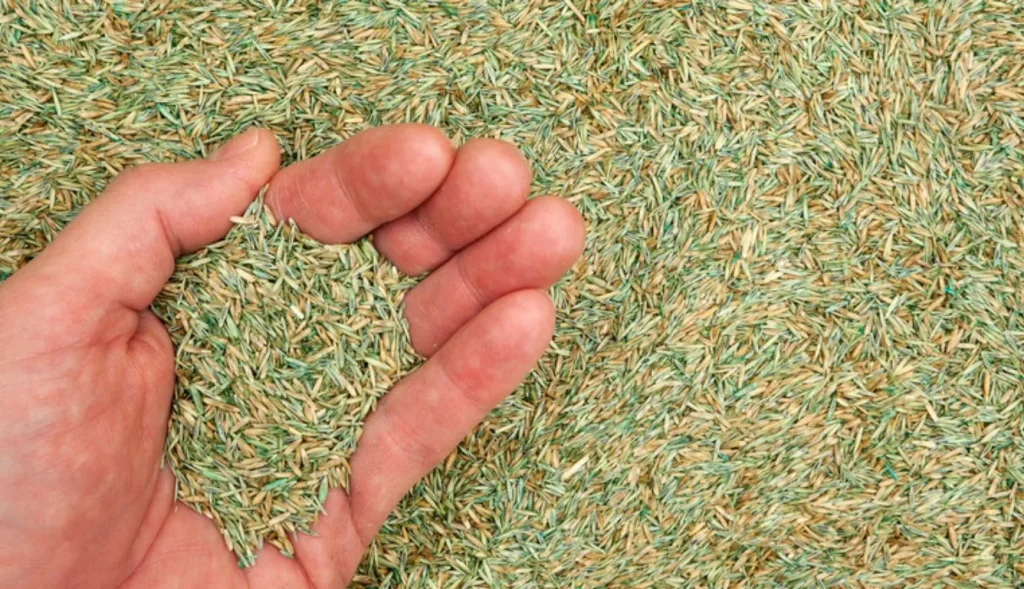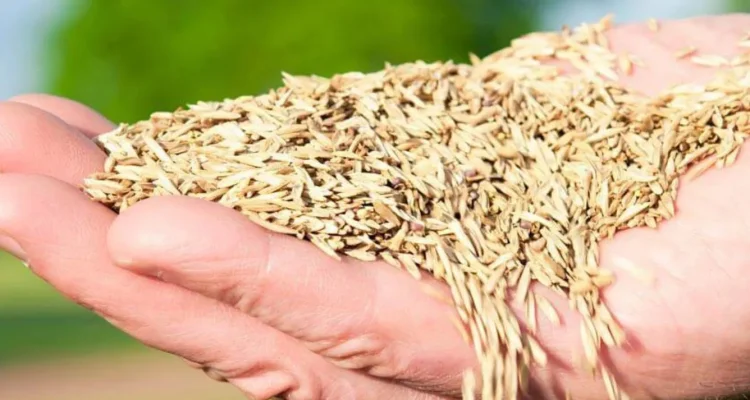Introduction
Grass seed is a critical component for maintaining healthy lawns and lush landscapes. However, many homeowners and landscapers are often surprised by the high cost of grass seed. In this article, we’ll dive into the reasons behind the rising prices of grass seed and explore the factors that contribute to its expense.

Types of Grass Seed
Cool-Season vs. Warm-Season Grasses
Grass seeds are categorized into cool-season and warm-season types, each suited to different climates. Cool-season grasses, such as Kentucky bluegrass and fescue, thrive in cooler temperatures and are ideal for northern regions. Warm-season grasses, like Bermuda and zoysia, flourish in warmer climates and are best for southern areas. The type of grass seed you choose can significantly affect the cost, as certain varieties are more expensive due to their specific growing requirements and benefits.
High-Quality vs. Standard Seeds
High-quality grass seeds are often more expensive than standard varieties. Premium seeds are bred for superior characteristics such as drought resistance, disease resistance, and lush appearance. While standard seeds might be more affordable, they may not offer the same performance or longevity.
Factors Influencing Grass Seed Prices
Genetic Factors
Hybrid vs. Non-Hybrid Seeds
Hybrid grass seeds are developed by cross-breeding different grass varieties to produce superior traits. These seeds are usually more expensive due to the complexity of the breeding process and their enhanced qualities. Non-hybrid seeds, while cheaper, may not provide the same level of performance.
Seed Processing
Cleaning and Treatment Costs
After harvesting, grass seeds undergo cleaning and treatment to remove debris and improve germination rates. These processes add to the overall cost of the seeds. Additionally, seeds that are treated with fertilizers or pesticides will have higher prices due to the added costs of these treatments.
Market Demand and Supply
Seasonal Demand
Grass seed prices can fluctuate based on seasonal demand. During the peak growing seasons, the demand for seeds increases, which can drive up prices. Conversely, prices might drop during the off-season when demand is lower.
Supply Chain Issues
Supply chain disruptions, such as those caused by weather events or transportation delays, can affect the availability of grass seeds and subsequently impact their prices. Additionally, global events that affect agricultural production can lead to shortages and higher costs.
Economic Factors Affecting Grass Seed Prices
Production Costs
Land and Labor
The costs associated with growing and harvesting grass seed include land, labor, and equipment. Increases in these production costs can lead to higher prices for consumers. For instance, changes in minimum wage laws or rising land lease rates can directly impact seed costs.
Import and Export Costs
Tariffs and Transportation
For regions that rely on imported grass seeds, tariffs and transportation costs can significantly affect prices. Import duties and shipping fees contribute to the overall expense of seeds, especially if they are sourced from international suppliers.
Climate Impact
Weather Conditions Affecting Yield
Weather plays a crucial role in grass seed production. Adverse weather conditions, such as droughts or floods, can reduce crop yields and drive up prices. Farmers may also face increased costs for irrigation and other weather-related measures, which can be reflected in the price of the seeds.
The Role of Research and Development
Investment in New Varieties
Research and development in grass seed technology involve significant investment to create new varieties with improved traits. These innovations can enhance seed performance but also come with higher costs. The ongoing research into drought resistance, disease resistance, and overall durability contributes to the higher price of advanced seed varieties.
Enhanced Disease and Pest Resistance
Grass seeds with built-in resistance to diseases and pests are often priced higher due to the additional research and development required. These seeds can save money in the long run by reducing the need for chemical treatments and improving lawn health.
Comparing Grass Seed Prices
Local vs. Online Retailers
Prices for grass seeds can vary depending on where you purchase them. Local garden centers and hardware stores may offer different pricing compared to online retailers. Shopping online can sometimes yield better deals, but it’s important to factor in shipping costs.
Bulk Buying vs. Single Packs
Buying grass seed in bulk can be more cost-effective than purchasing single packs. Bulk purchases often come with discounts and can save money, especially if you have a large area to seed. However, be sure to consider the shelf life of the seeds to avoid wastage.
Tips for Saving on Grass Seed
Buying in Bulk
Cost-Effectiveness
Purchasing grass seed in larger quantities can lead to substantial savings. Bulk buying not only reduces the per-unit cost but also minimizes the frequency of re-purchasing, making it a cost-effective option for large lawns or multiple projects.
Choosing the Right Type for Your Region
Climate-Specific Seeds
Selecting grass seeds that are suited to your local climate can improve germination rates and reduce the need for additional treatments. Choosing seeds that are specifically tailored to your region’s weather conditions can ultimately save money by ensuring better growth and fewer issues.
Utilizing Coupons and Discounts
Look out for promotions, coupons, and seasonal discounts when purchasing grass seed. Many retailers offer discounts at different times of the year, which can help reduce the cost of your purchase.
FAQs
What is the most cost-effective grass seed type?
The most cost-effective grass seed type depends on your specific needs and location. Generally, standard grass seeds suited to your local climate can be more affordable while still providing good results.
How can I find the best deals on grass seed?
To find the best deals, compare prices from local and online retailers, look for bulk buying options, and check for seasonal discounts and coupons.
Why do some grass seeds cost more than others?
Grass seeds may cost more due to factors such as hybrid breeding, advanced processing, disease resistance, and supply chain issues. Higher quality and specialized seeds typically come with a higher price tag.
What impact does climate have on grass seed prices?
Climate can affect grass seed prices through its impact on production yields and growing conditions. Adverse weather can lead to higher prices due to reduced supply and increased production costs.
How often should I re-seed my lawn to get the best results?
Re-seeding frequency depends on your lawn’s condition and the type of grass. Generally, re-seeding every 1-3 years can help maintain a healthy, dense lawn.
Conclusion
The cost of grass seed can be attributed to various factors including genetic quality, processing, market dynamics, and economic conditions. Understanding these factors can help you make informed decisions and potentially save on your grass seed purchases. By considering the type of seed, buying in bulk, and keeping an eye out for discounts, you can manage your lawn care budget more effectively.


Congratulation!